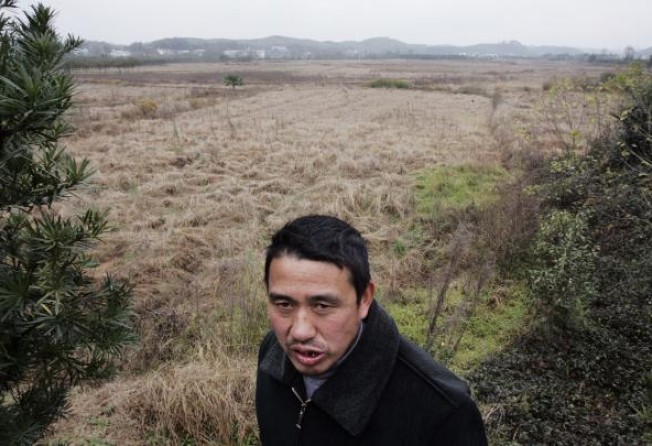China should release data on polluted soil
Hu Shuli says it should release the findings of the long-awaited study on soil contamination, if it is to honour its pledge of action at the party congress

The high-profile emphasis on environmental protection at the Communist Party's 18th national congress was eye-catching. The news immediately boosted the A shares of environment-related industries, and spurred industry demands for timely information on the environment.
China's development to become the world's second-largest economy over the past 30 years has come at a heavy environmental price. Environmental management as a whole has been deteriorating despite minor improvements, while mass protests related to environmental issues have been on the rise. At the congress, officials pledged to improve environmental assessment, strengthen accountability and raise public awareness. To do this, they must insist on transparency.
On that note, it's disturbing that a long-awaited national survey on soil pollution has not seen the light of day. The study, a joint project of the Ministry of Environmental Protection and the Ministry of Land and Resources that started in 2006, was the first of its kind in China. The aim was to find out the extent of land pollution across the country, so measures, legislative and otherwise, could be taken to tackle the problem. The study was reportedly completed in 2010.
Yet, to date, the findings have not been made public; no effective action has been taken to clean up polluted land or assist those affected; no individual or group has been held seriously accountable for any damage; and no law has been introduced. The president's report at the congress identified environmental problems as a public health issue. It named three major types of pollution - water, air and soil - and called for strengthened measures to control and prevent pollution.
All three types of pollution are equally harmful, though the damage caused by soil pollution is not always easy to detect. The "itai-itai disease", a weakening of the bones caused by cadmium poisoning, is a dreaded pollution-induced disease in Japan. In China, high levels of cadmium have been detected in the blood, urine and hair of people living in rural areas, as documented by a 2011 Caixin report. What's worrying is that the extent of cadmium's harm to the body is still not fully known.
Soil pollution in China is among the worst the world has seen, according to data released in 2006 by the Ministry of Environmental Protection: some 150 million mu (10 million hectares) of the country's arable land was found to be polluted, while 32.5 million mu was being irrigated with contaminated water. In addition, 2 million mu of land was used as dumpsites. That adds up to a total of 184.5 million mu of polluted land, a tenth of the 1.8 billion mu of arable land in China. Also, it is estimated that every year, up to 12 million tonnes of food - or 20billion yuan's (HK$25billion) worth - are contaminated by heavy metal.
Inside sources told the media that even this did not reflect the full scale of the problem as the data was collected in the 1990s, and the situation would be far worse now. Late last month, the State Council introduced a plan to restore polluted soil, yet we're still waiting to be told the latest figures.
Officials fear that telling the truth would upset their prized "social stability". But this fear is unreasonable. Three years ago, a study by the Housing Ministry on the quality of drinking water in bigger cities found that only 58.2per cent of the 4,000 cities surveyed enjoyed water that met official standards. But the results were not released until a Caixin report this May forced the ministry to make public the report. The publication of this information did not upset stability; instead, it spurred the community to reach a consensus on pollution control.
The authorities must release the findings of their soil pollution surveys as soon as possible, for the sake of the well-being of its people and for the country as a whole.
People have the right to know if their living environment and farmlands are polluted and, if so, to what extent. They need this information to assess the risks they face and to work out the appropriate countermeasures to take. Transparency can reduce people's suspicion of the government and avert radical protests.
Moreover, such crucial information will help shape the formulation of future preventive measures. We also need to find out who the polluters are and penalise them, or else the country will surely suffer even more serious pollution.
More importantly, this concerns the credibility of the government. According to regulations on the disclosure of government information, enacted in May 2008, the authorities must disclose timely information to the public, such as the extent and location of polluted land. Also, the information must be in plain language, something made clear by the way the government handled the release of air pollution information related to PM2.5 fine particles.
The 18th congress called for a systematic approach to environmental management. It proposed ways to hold polluters accountable, and compensate those harmed by the pollution. The timely disclosure of information should become mandatory.
The government can take the first step by disclosing the data on soil pollution. As our new leader Xi Jinping said in the inauguration of his party chairmanship: "This is a national responsibility; responsibility for the people."